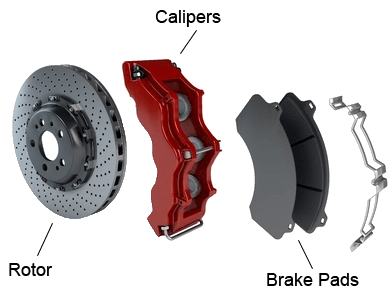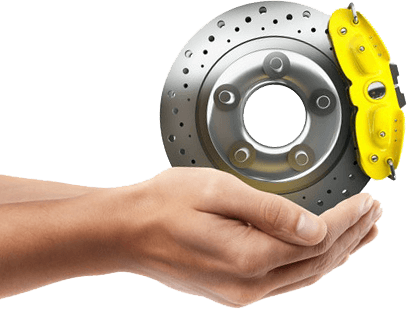Brake Specialists @ RS Auto Clinic
Whether you need new brake pads, shoes, drums, rotors, calipers, hoses, fluid flush, or a professional brake inspection, RS Auto Clinic is here to help. Call today!

Brake Specialists @ RS Auto Clinic
Whether you need new brake pads, shoes, drums, rotors, calipers, hoses, fluid flush, or a professional brake inspection, RS Auto Clinic is here to help. Call today!

Voted #1 Best Brake Service & Repair in Burlington!
Thank you for voting for us in the Burlington Post Readers' Choice Awards for ten years in a row! In 2025, RS Auto Clinic won diamond awards for Best Auto Service Centre, Best Brake Service & Repair, Best Muffler & Exhaust Services, Best Oil / Lube Change and Best Tire Sales & Services. Ron Snell and Martin Brady also received diamond awards for Best Auto Mechanic/Technician and Best Auto Service Advisor respectively.
Lifetime Warranty on Brake Pads
*Qualifying pads only. Call or visit the shop for details.
For brake service or replacement, call (905) 335-1313 or book your appointment online.
Brakes are the single most important safety feature of your vehicle. We all know the importance of our brakes, but how do they work? Are all brakes the same quality? When should I get my brakes inspected or replaced?
A moving car has loads of kinetic energy. When you apply the brakes, you engage a complex system designed to dissipate this energy as efficiently as possible to slow the car down. Without power assistance, you could never generate enough force to quickly slow down a car simply by pushing the brake pedal with your foot. Instead, when you apply the brake pedal, you are actually pushing against a piston in the master cylinder, which forces incompressible hydraulic brake fluid through a series of pipes and hoses to the braking unit at each wheel. Because the cylinders near the brakes are much wider than the one near the brake pedal, the force you originally applied is greatly multiplied.
All of this force is then transferred to pistons in the brake caliper, which fits over the rotor like a clamp. Inside each caliper is a pair of brake pads. These brake pads are clamped against the brake disc or rotor. This generates a massive amount of friction, which slows down the wheels and stops the car.

Like most car parts, many people don't realize that there are different qualities of brake components.
What to look for when buying brake pads and rotors:
For example, high quality ceramic brake pads can handle extremely high temperatures and recover much faster than semi-metallic brake pads. They also virtually eliminate brake dust, they are typically much quieter than other materials, and are often lighter than metallic brake pads which can increase fuel efficiency.
Futhermore, coated pads and rotors offer longer life, reduce rust, and often come with extended warranties that are simply not available on lower quality parts.
Although coated ceramic brake pads and rotors have a higher upfront cost than their lower quality alternatives, they will often save you money in the long run due to their longer life and durability, not to mention they are simply better brakes. The lower cost of 'second line' brakes is usually not enough to justify the decrease in quality and will likely require replacing more frequently.
At RS Auto Clinic we will always recommend first line brake components for these reasons. We also carry second line parts for customers who prefer the upfront savings. Note that some auto repair shops quote with third line parts which we do not install due to their unreliability and extremely short life span.
Brake pads wear out at different rates depending on your driving style, the weight of your vehicle, and the quality of your brake pads and rotors. City driving requires more frequent braking, while stopping a vehicle travelling at highway speeds requires longer braking periods. Heavier vehicles will also wear out brakes faster than lighter vehicles due to the amount of energy needed to dissipate. While there is no hard and fast rule on when to get your brakes replaced or inspected, there are some symptoms to watch out for.
Almost all brake pads come with a built-in wear indicator. As the pad wears down, a small metal tab on the brake pad gets closer and closer to the rotor. When it finally makes contact, you will hear an audible screeching or scraping sound. When you hear the sound, it's time to change your pads. If you continue to operate your breaks too long after the pads are worn out, the scraping can turn into a rough grinding sound, at which point you could be damaging your rotors.
Rotors lose their thickness over time due to normal wear and tear, and they can become warped, causing vibration and pulsation in the brake pedal, as well as decreased stopping performance. Rotors can sometimes be resurfaced if they are still thick enough, otherwise they will need to be replaced.
If the brake pedal feels spongy or needs to be pressed down further than usual before engaging, this can be a symptom of brake fade. Brake fade is caused by a build-up of heat in the braking components or fluids. Brake fluid can absorb water over time which has very different characteristics than brake fluid when it comes to boiling points. When this water heats up, it can boil, which releases steam. Unlike fluid, steam is a gas which is compressible. This reduces the effectiveness of your hydraulics and reduces the amount of force applied to the calipers when braking.
Whether you need new brake pads, shoes, drums, rotors, calipers, hoses, fluid flush, or a professional brake inspection, RS Auto Clinic is here to help. We have over 25 years of experience fixing car brakes. Plus Ron is both a certified safety inspector and brake specialist.
Call (905) 335-1313 or make an appointment now!

Did you know?